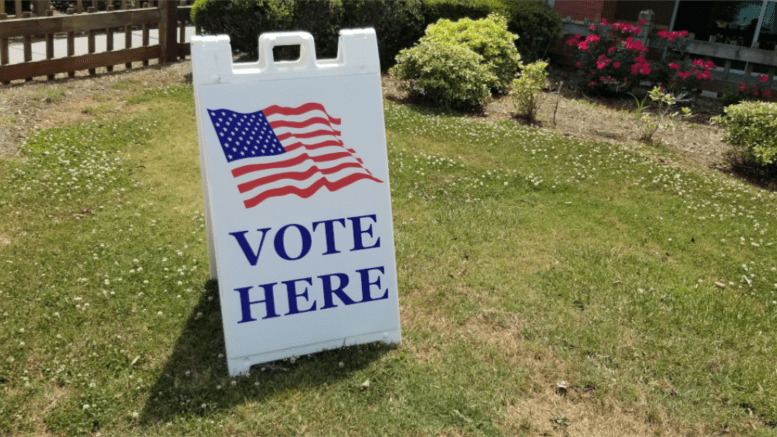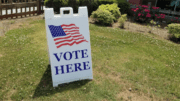by Zachary Roth, Georgia Recorder [This article first appeared in the Georgia Recorder, republished with permission]
April 2, 2023
A day after taking office in January, Alabama Secretary of State Wes Allen withdrew his state from the Electronic Registration Information Center, an interstate data-sharing compact aimed at helping states keep clean voter rolls.
Asked about the move a few days later by a conservative radio host, Allen, a Republican, at first talked about privacy concerns, and claimed, inaccurately, that ERIC was launched with funding from George Soros, the liberal billionaire and a familiar bogeyman on the right.
Then, Allen offered another explanation.
“(ERIC) was a way to really identify who was not registered to vote,” Allen said, referring to ERIC’s requirement that member states reach out to eligible but unregistered voters and urge them to get on the rolls. “And then, per the contract, the state would have to contact these voters and encourage them to get registered to vote.”
Since Alabama’s departure from ERIC, five more Republican-led states — Florida, West Virginia, Missouri, Ohio, and on March 22, Iowa — have left, and Texas and Alaska could be poised to join them. Louisiana withdrew last year. (North Carolina isn’t an ERIC member, but a proposed House budget would bar the state from joining.)
Experts say it’ll now be harder for these states to maintain accurate voter rolls, something they say they’re committed to. The exodus could also hurt states that remain members, by reducing the pool of states with whom they can compare rolls, making it harder to catch people who are double-registered.
None of the state officials from the other departing states has been quite as explicit as Allen was. But, while state officials and much media coverage have focused on concerns about partisanship among ERIC officials, and false conspiracy theories about Soros, some other state officials also cited ERIC’s voter outreach mandate as an important factor in their decisions to withdraw.
That underscores how, in a hyper-polarized political moment, even apolitical steps to boost voter participation that once were broadly supported as promoting civic health are now at risk.
Georgia Secretary of State Brad Raffensperger recently reaffirmed his commitment to sticking with the ERIC system. He said ERIC is a valuable tool to fight fraud and cancel outdated registrations.
Sharing voter registration, motor vehicle records
Founded in 2012 with seed funding from Pew Charitable Trusts, and with the election administration expert David Becker playing a lead role, ERIC allows states to share voter registration and motor vehicle records with each other, so that they can identify and remove from the rolls people who have died or moved out of state, including those that are registered in multiple states.
At its peak, ERIC had 34 members, from deep-blue Massachusetts to bright-red South Carolina, qualifying as a rare bipartisan success story.
Among the data that ERIC provides for states are records of eligible but unregistered voters, sometimes called EBUs. ERIC’s bylaws say that each time a state receives this data, the state must “initiate contact with each and every eligible or possibly eligible citizen and inform them how to register to vote.”
States don’t have to contact EBUs more than once at the same address, nor must they contact EBUs who have confirmed that they don’t want to be contacted for voter registration purposes.
States that don’t contact at least 95% of their EBUs before the next federal election are removed from ERIC, unless they can point to policies that accomplished ERIC’s voter registration goals through another method.
In recent months, some Republican chief election officials had been pressing ERIC to drop the requirement that states reach out to EBUs. In a March 6 letter, Ohio Secretary of State Frank LaRose warned ERIC that the state would leave unless the group approved several changes at its upcoming board meeting, including making it optional for states to contact EBUs.
ERIC should allow “member states to utilize ERIC’s data-sharing services ‘a la carte,’ in the manner which they believe best serves their local interests,” LaRose wrote. “For example, members should not be forced to meet specific requirements, such as Eligible but Unregistered voter mailings or cross-state fraud analysis, if they do not deem those actions necessary or relevant to the needs of their respective states.”
That proposal, and several others, failed to pass at the March 17 meeting. Changes to the group’s laws require 80% support from board members to pass. In response to the votes, Ohio and Iowa announced their departures from ERIC.
Likewise, when Missouri Secretary of State John Ashcroft announced his state’s exit from ERIC in a March 6 letter, the first reason he listed was his view that ERIC doesn’t do enough to address voter fraud. The second was the voter outreach requirement.
“ERIC focuses on adding names to voter rolls by requiring a solicitation to individuals who already had an opportunity to register to vote and made the conscious decision to not be registered,” Ashcroft wrote.
“I don’t think we should be harassing people,” Ashcroft later told a reporter.
And a bill introduced in late March by a Republican state lawmaker in Arizona to remove the state from ERIC also would bar it from joining any organization that requires the mailing of registration forms to unregistered voters.
Other complaints
State officials leaving ERIC have given other reasons for the move.
Ashcroft’s letter referred to a “hyper-partisan individual” who is a non-voting member of ERIC’s board — a reference to Becker, who announced March 14 he was stepping down from the board. Becker has disputed that characterization, pointing to a recent letter supporting him that was signed by 24 current and former Republican state and local officials.
Others have cited concerns over data privacy. Florida Secretary of State Cord Byrd said he’s withdrawing because of an “obligation to protect the personal information of Florida’s citizens.” Byrd also referred to ERIC’s “potential partisan leanings,” another apparent reference to Becker’s role on the board.
“ERIC is never connected to any state’s voter registration system,” ERIC executive director Shane Hamlin said in a March 2 statement. “Members retain complete control over their voter rolls and they use the reports we provide in ways that comply with federal and state laws. We follow widely accepted security protocols for handling the data we utilize to create the reports.”
But the registration issue has cropped up frequently. At the heart of many of the conspiracy theories that played a key role in stoking anti-ERIC feeling among conservative activists is the fear that the group is part of a left-wing plot to take control of voter rolls and register as many people as possible.
An October 2022 investigation in The American Conservative, “The Left’s Taxpayer-Funded Voter Registration Machine,” argues that ERIC and other groups that work to expand access to voter registration “represent the transition from private- to government-funded registration campaigns, the next stage in the left’s election plans.” The final stage, the author argues, “is to automatically register everyone. In effect, ‘citizen’ would become synonymous with ‘registered voter.’”
Allen, the Alabama Secretary of State, agrees. “Here’s the deal: The left, one of their holy grails is really automatic voter registration,” he said in the radio interview, explaining why he left ERIC. “That’s what they want.”
Automatic voter registration
Since 2015, 22 states and the District of Columbia have adopted some form of automatic voter registration, in which eligible voters are automatically added to the rolls when they have contact with government agencies like the motor vehicles department, unless they choose to opt out. Research suggests it’s an effective reform for boosting voter turnout.
But a fear of automatic voter registration also has helped drive the Republican-led campaign against “Zuck Bucks.”
Since 2021, 24 states, all but one with GOP-controlled legislatures, have banned elections offices from receiving outside funding for election administration activities. The push came after the Center for Tech and Civic Life, which is funded by Facebook founder Mark Zuckerberg, issued around $400 million in grants to elections offices for the 2020 election, which paid for voting equipment, voter outreach, and other needed expenses.
The funding is said to have played a key role in ensuring that voting was accessible for most Americans despite the pandemic.
The Georgia Legislature last week approved a ban on donations to prohibit nonprofits and outside organizations from donating directly to city and county election offices.
Allen and other ERIC critics have charged that the group shared voter data with the Center for Election Innovation and Technology, a nonprofit that works with local election officials to improve election administration. The group was among those funded by Zuckerberg’s CTCL, and is led by Becker.
Helping to get more voters registered is a valuable civic goal in itself, so it’s natural that non-partisan groups like ERIC and many others, which exist to strengthen democracy and elections, might work to do so.
But it’s not hard to see why some conservatives might not like it. Although the recent movement of both white and non-white working-class voters toward Republicans may lead the GOP to see the value in registering new voters, for now, at least, adding more voters to the rolls is more central to the electoral strategy of Democrats than Republicans.
In 2021, Democrats announced a nearly $5 million voter registration campaign in battleground states ahead of last year’s midterms — which was criticized as inadequate by some on the left. A slew of state-based progressive groups ran their own registration and mobilization programs. Republican spending, by contrast, was focused mostly on “election integrity” efforts, including lawsuits and poll-worker recruitment.
Indeed, plenty on the right don’t subscribe to the widely accepted idea that more participation is a civic good. Seventy-one percent of Republican respondents to a 2021 Pew poll said that people should have to prove they really want to vote by registering ahead of time, while just 28% said everything possible should be done to make it easy for every citizen to vote. For Democrats, those numbers were 14% and 85%, respectively.
Allen, explaining in the radio interview why he opposes ERIC’s voter registration requirement, left no doubt about his aversion to efforts to expand access.
“Our job is not to turn people out,” Allen said. “That is the job of the candidates — to make people excited to go to the polls. Our job is to make sure Alabama elections are the safest in the country.”
In fact, a resolution of the National Association of Secretaries of State, reauthorized last year, states that all members “are committed to encouraging voter registration and increasing access to elections.”
Asked about the apparent contradiction, Allen’s office did not immediately respond.
Georgia Recorder is part of States Newsroom, a network of news bureaus supported by grants and a coalition of donors as a 501c(3) public charity. Georgia Recorder maintains editorial independence. Contact Editor John McCosh for questions: info@georgiarecorder.com. Follow Georgia Recorder on Facebook and Twitter.



